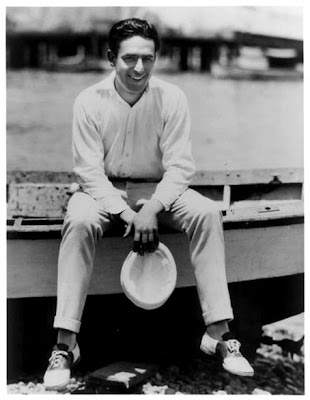As so often happens, a hunt for a decent version of Kurt Weill's September Song turned into something quite else.
I kept playing different versions, 90% of them embedded in those godawful schmaltzy '60s string arrangements (and Frank Sinatra's brilliant version was thus ruined for me), then finally coming upon Billie Holliday. Wow, she aced it: undersinging it with that incomparable throw-away voice that made it sound easy. Here at last was something I could post! But I still had to listen to a few more, and when I heard Sarah Vaughan. . .
It too was magnificent, perhaps even sweeter, if a bit less subtle. But as I listened to it over and over again, I noticed something strange.
These two versions are done with exactly the same arrangement. I mean EXACTLY the same. The smoky slow-dancing tempo, the sax licks, the piano, the soulful guitar. It's as if someone lifted the vocal track out of one song and plunked it down in the other.
So fine, I guess this was a popular arrangement for September Song during that time - when was it, the '40s? My YouTube info is scant. But - identical? That's just so strange. Why would two titans of song decide to do it that way, when all these singers tried so hard not to sound like each other?
Anyway, this is valuable for an example of Billie Holliday before she degraded into a heap of irritating mannerisms. She still had a voice. Sarah Vaughan went on for far longer, not being a heroin addict, but was she ever so poignant again?
Why do I post this? Oh. . . cornball as it is, it's September, the kids are going back to school, and I at last understand that line "one hasn't got time for the waiting game". It's really one of my favorite songs, especially those two melancholy chords in the first line under "em-ber".
I have this memory - surely it must be wrong, but I don't think so - of watching TV eons ago, probably when I was about ten, and seeing Rodney Dangerfield on a variety show. Sometimes comedians stepped out of their normal roles then, with mixed results (and I swear I remember him singing The Fool on the Hill, and he shouldn't have). But I swear, and I may be wrong, I heard him speak-sing this one and it wrenched my heart. What did I know of Kurt Weill then? Well, plenty, since my histrionic sister had come back from Europe speaking German, waving copies of Goethe and singing little ditties from Mahagonny. Moon of Alabama (later recorded, incredibly, by The Doors) was practically my cradle song.
I can't find Rodney Dangerfield singing September Song, but I did find this odd twinning of two of the greatest voices ever, each slotted into the exact same arrangement. I still don't know why it happened that way, but it's intriguing to listen to.
We won't go into the melancholy I feel when I hear this, summer running through my fingers so fast it scares me, fall lifting up hopes that invariably fail. I wonder if I want to live out my 50s or if it might be better to make a graceful exit right now, before real deterioration sets in. I can't quite bring myself to dive in front of a bus, however (not today, anyway): I just hate suicide, too many people I loved have done it, not that I haven't thought about it a few hundred or a few thousand times.
One hasn't got time for the waiting game. But - for what?
CODA. As usual, I found more just as I gave up. I had this feeling the words were just a little different in the original version from the stage musical, Knickerbocker Holiday (and how a song like this ended up in such a jolly-sounding production, we'll never know).
Darker, stranger, and even with certan subtexts which may or may not have been intended.
I played me a waiting game
If a maid refused me with tossing curls
I'd let the old Earth take a couple of whirls
While I plied her with tears in place of pearls
And as time came around, she came my way
As time came around, she came
And the days grow short when you reach September
And the autumn weather turns the leaves to flame
And I haven't got time for the waiting game
And the wine dwindles down to a precious brew
September, November
And these few vintage years I'd share with you
These vintage years I'd share with you
And the days grow short when you reach September
And I have lost one tooth and I walk a little lame
And I haven't got time for the waiting game
And the days turn to gold as they grow few
September, November
And these few golden days I'd spend with you
These golden days I'd spend with you.
They court you in song and rhyme
They woo you with words and a clover ring
But if you examine the goods they bring
They have little to offer but the songs they sing
And a plentiful waste of time of day
A plentiful waste of time
But it's a long, long while from May to December
Will the clover ring last till you reach September
And I'm not quite equipped for the waiting game
But I have a little money and I have a little fame
And the days dwindle down to a precious few
September, November
And these few precious days I'd spend with you
These precious days I'd spend with you
Hmmmmm. "Clover ring"? And who are these young men? The line "I've lost one tooth and I walk a little lame" does somewhat take away from the smooth romanticism we've come to associate with the song. It's a bit macabre, in fact: offputting. And those tossing curls (rhymed, of course, with pearls): the antiquated courtly language. And the reference to wine. As with Woody Allen's mother and the boiled chicken, hasn't this song been put through the deflavorizing machine?
You decide.
CODA TO THE CODA. Playing these two versions over once again, I'm embarrassed, because I honestly think they're the same recording. They are just TOO alike to be different renditions, different voices. I think someone mislabeled one of the recordings. So we're left to wonder, who's Sarah and who's Lady Day? Or are both of them someone else?













































.jpg)




